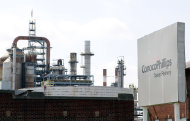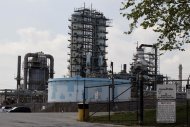Delta Air Lines is buying a refinery in a novel — and some say risky — attempt to slice $300 million a year from its escalating jet fuel bill.
The airline said Monday that it is buying the refinery near Philadelphia for $150 million from Phillips 66, a refining company being spun off from ConocoPhillips. The refinery has struggled to make money, and ConocoPhillips planned to shut it down if it couldn't find a buyer.
So why is Delta buying it?Fuel is the largest and most volatile expense for the major airlines. They paid an average of $2.86 a gallon for jet fuel last year, up from $2.09 in 2007, according to statistics from the Bureau of Transportation. Nobody likes to see the price of gas climb, but for airlines consuming billions of gallons a year, it can be downright crippling. Consider this: Delta's planes burned through 3.9 billion gallons of fuel last year, costing the airline $11.8 billion — 36 percent of its operating expenses.
Airlines have been trying to combat the rising fuel cost by purchasing more fuel-efficient airplanes and experimenting with different types of fuels. But neither is an immediate solution: It can take a decade to modernize an entire fleet and biofuels, which are made from plants, are not economically feasible. Airlines also try to limit their exposure to big price spikes through a process known as hedging. The catch: if prices fall dramatically, they end up losing a lot of money.Jet fuel has the fattest profit margins of any product that refineries make, said Delta CEO Richard Anderson, "and they're taking it from airlines." He called it a "modest investment" comparable to buying one new large jet aircraft.
Still, even though fuel has overtaken labor as the industry's biggest expense during the past decade, no airline has ever bought a refinery.
Refining, the practice of taking crude oil and turning it into fuels, is notorious for boom-and-bust cycles. ConocoPhillips and other oil giants are getting out of the refining business because they haven't been consistently profitable. Refineries are paying high prices for oil, particularly on the East Coast, where they import a lot of more-expensive oil. At the same time, demand for gasoline has fallen because of the weak economy and because cars and trucks are getting better gas mileage.
As a refinery owner, Delta will still need that more-expensive crude oil to make jet fuel.
"This business is not without risk," said Ben Brockwell, pricing director at the Oil Price Information Service. "But they thought this is a risk they're willing to take."
Ray Neidl, an airline specialist with the Maxim Group, said it's worth a shot. He notes that for Delta the purchase price is only "about the cost of a widebody aircraft." Though no airline has ever owned a refinery, Delta could be on the cutting edge.
"If this works, you're going to see everybody doing it," he said.
The deal might benefit drivers more than fliers. If ConocoPhillips had closed the refinery, that would have reduced supplies along the East Coast and possibly led to higher prices at the gas pump.
Delta's Monroe Energy LLC subsidiary will spend $100 million to make changes to the refinery to maximize the production of jet fuel. The refinery processes 185,000 barrels per day of crude oil. Delta said it will make 52,000 barrels per day of jet fuel once it's modified. Delta said it will trade the gasoline, diesel and other products of the refining process with BP and Phillps 66 locations around the U.S for another 120,000 barrels per day of jet fuel.
The deal also includes pipelines that will help move the jet fuel to Delta's operations in the Northeast, including its hubs at LaGuardia and JFK airports in New York.Delta Air Lines Inc., which is based in Atlanta, said it expects the deal to close by the end of June, with jet fuel production beginning during the third quarter. Changes to expand jet fuel production should be done by the end of the third quarter. Delta said it expects the refinery to pay for itself by the end of the first year of operation.
The purchase price includes an expected $30 million in job-creation assistance from the state of Pennsylvania. The money represents is an "opportunity" grant contingent on Monroe Energy investing at least $350 million at the site, including the cost to buy it, and maintaining at least 402 full-time workers there for at least five years, according to Steve Kratz, a spokesman for the state's Department of Community and Economic Development.















No comments:
Post a Comment